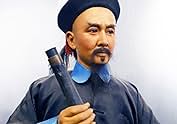(for "The Chinese Revolution through Film" taught by Prof. B. Weiner)
Directed in 1958, this movie, Lin Zexu, reflects the imagined myth of that famous person who has a big impact on modern China. In my opinion, the movie depicts two different faces of Lin Zexu. On one side, Lin is a competent official who wins the support from the local community and serves loyally to the Qing emperor. On the other side, Lin is made into a hero of anti-imperialist, anti-colonialism and anti- capitalism. The conflict between these two roles marks the complex interpretation of Lin Zexu and the Opium War.
To some extent, the image of Lin Zexu in the movie is quite similar to traditional well- reputed government officials, such as Bao Zheng and Hai Rui: he sides with ordinary people who suffer from villains (foreigners in this movie), fights with corrupt officials and is memorized by the community when exiled.
In the latter half of the film, after Lin is dismissed from his position (striped off his insignia of rank), staying at home, Lin lies back into the chair silently and a book named Chu Ci (verses of Chu) is spread on the floor. Chu Ci is authored mainly by Qu Yuan, who is a loyal minister who lived in the Warring State period of China and worried about the future of his own state (State of Chu), but is slandered by corrupted ministers and then exiled by the king. Feeling deeply depressed of the fate of himself as well as his state, Qu Yuan commit suicide to end his life. This scene gives a hint to the similarity between the tragic fate of a minister in ancient China and a commissioner in Late-Imperial China, in which both of them fall out of favor with the monarch. There may be a deeper meaning underlying it: though more than thousands of years has passed from Qu Yuan to Lin Zexu, the plot that a loyal minister is framed by a villain near the gullible monarch doesn't change a lot.
However, the Daoguang Emperor rendered in this movie is not that mindless. In general, Daoguang is depicted as an intelligent and benevolent monarch. He cares about the well-being of the ruled people and supports the suppression of opium- smoking enthusiastically at first. It is only after corrupted ministers make falsified evidence to prove Lin's disloyalty that Daoguang doesn't trust Lin Zexu anymore. Why does the director render Daoguang as a positive, or at least a neutral figure? One possible reason may be that presenting Daoguang as an incompetent and insane dictator may make the audience think of the deficiencies of "New China"'s monarch, Chairman Mao.
Yet another more plausible reason may be that it matches a common imagination from ordinary Chinese people that the Emperor is a good one, and most officials are capable, which would have led to a bright future if a handful of bad guys (traitors or the corrupt) didn't sabotage their efforts. For example, the official interpretation of Cultural Revolution matches this imagination: It is claimed by the authority that Mao Zedong is not mainly responsible for this movement because he is tricked by the Gang of Four to start the movement. To put it simple, the ruler usually does good things, sometimes he does bad things but he is not responsible for that because he is tricked by villains.
The other side of Lin Zexu as an anti-imperialist and anti-colonialist hero looks a bit weird in the movie, as it is more like an invention in the 20th century with the development of nationalism. The film starts with a few bas-relief depicting the working and fighting scene focused on labouring people, which is quite similar to the bas-relief on the monument of the People's Heros, indicating the important role played by ordinary people in the movie.
In the very last scene, the Guangzhou people siege and rush to British Army with cold weapon (Sanyuanli Incident), while the exiled Lin Zexu ride a horse escorted by soldiers and looks back to the direction of Guangzhou. This scene is obviously the propaganda of the strategy of "People's War", which is common in communist China. In fact, the final fighting scene between local people and British invader doesn't exist in the original film. Zhou Enlai, the Premier of China, suggests the director to add this scene so that the movie looks more political correct at that time.
Apart from the movie, it is also worth mentioning about the life of the director, Zheng Junli. He has been a famous left-wing actor in Shanghai for years before he becomes a director. He is a friend of Jiang Qing when they are both famous actors in Shanghai. After the shot of the well-received Lin Zexu, he is admitted to the Communist Party of China. Ironically but not surprisingly, Zheng Junli, a competent director who serves loyally for the Communist Party, is persecuted severally during the Cultural Revolution and died in prison in 1969. And Jiang Qing, who is now the wife of Mao Zedong, plays the villain and leads the persecution on Zheng Junli specially. — September 6, 2016




